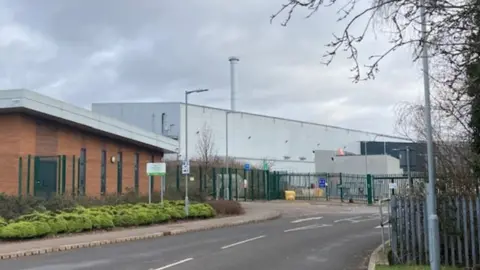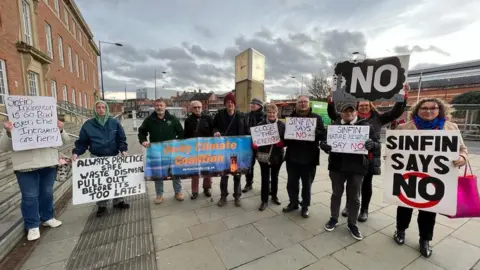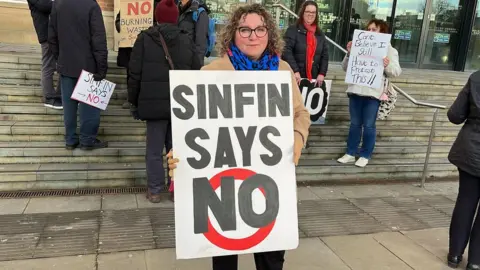Sinfin waste plant: Campaigners vow to continue fight against centre
 BBC
BBCCampaigners have said they will continue to fight plans to open a controversial waste plant in Derby.
Plans for the Sinfin Lane site to be repaired and used to treat non-recyclable waste were approved by two councils on Thursday.
Campaigner Simon Bacon said it was "not rocket science" to link local issues to the site.
The centre, which has never been in use, has already cost taxpayers £34.5m to maintain.
The project was mothballed in 2019 after a waste management contract between the authorities and Resource Recovery Solutions (RRS) - which had been commissioned to design, build and operate the facility - came to an end.

Both Derby City Council and Derbyshire County Council's cabinets voted to open the plant at respective meetings.
Campaigners have repeatedly raised concerns regarding air quality and said the plant would cause environmental issues.
They protested outside Derby's Council House on Thursday, calling for the plant to be knocked down.
Despite the councils' decisions, Mr Bacon said residents would continue to fight the opening of the waste plant.
"The community suffered massive fly issues when there was some testing taking place at the facility - when volumes of waste were going in," he said.
"The flies stopped as soon as the site closed. They've never returned.
"It's not rocket science to know it's potentially come from this site.
"Obviously you've got your odour issues, which are not nice in themselves and then you've got all the emissions issues from the stack."

Analysis
By Georgia Roberts, BBC Radio Derby political reporter
The Sinfin waste plant was intended to divert 190,000 tonnes of rubbish per year away from expensive landfill by heat-treating it to produce a gas, which it would then burn to create enough electricity to power 14,000 homes.
But it was controversial right from its initial approval in 2012, with local residents and campaigners especially concerned about environmental and air quality issues.
Both Derby City Council and Derbyshire County Council share responsibility for it, and contracted a firm called Resource Recovery Solutions to manage it.
It was supposed to open in 2017 but did not pass initial testing. It was eventually mothballed in 2019 before it could come into use.
There is also an ongoing legal dispute with the construction firm that was contracted to run it. Their argument is - we built this, and the council didn't pay.
The council says it didn't pay because the plant didn't pass the testing.

Journalists and the public were banned from attending the meetings to determine the project's future as councils said it would harm their "commercial interests".
This was criticised by Baggy Shanker, leader of the Derby City Council Labour group.
"An administration that says and espouses being open and transparent doing something like this, completely behind closed doors, doesn't sit right with me," he said.
He told the Local Democracy Reporting Service he was planning to "call-in" the decision made, meaning it could be reviewed.

Leader of the city council, Chris Poulter, said the decision to run the plant over the next two decades was considered more "cost effective" than closing the facility.
"The recommendation to rectify and use the facility offered the most viable, economic and cost-effective option and the best deal for council taxpayers in Derby and Derbyshire to provide a sustainable and long-term solution for dealing with household waste," he said.
Deputy leader of Derbyshire County Council, councillor Simon Spencer, added the plant remained the "best long-term solution".
"Not just in terms of the cost to council taxpayers and protecting them against rising costs of dealing with waste by other means in the future, but also for the benefit to the environment and our ongoing commitment to cut carbon emissions to help tackle climate change," he added.

Follow BBC East Midlands on Facebook, on Twitter, or on Instagram. Send your story ideas to [email protected].
